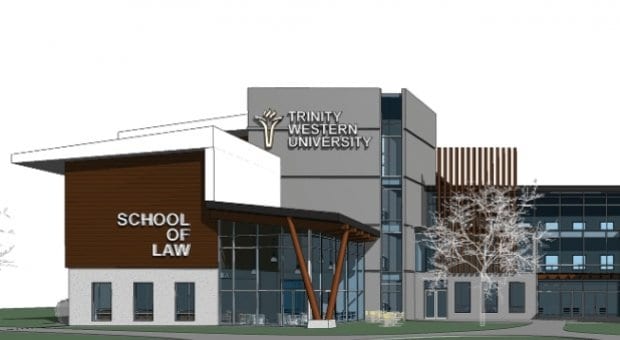A Victoria lawyer is urging members of BC’s legal profession to ask their law society to reconsider its April 11 approval of Trinity Western University’s (TWU) law school.
For admission to TWU, students must sign a covenant agreeing to uphold Christian biblical teachings, including no premarital sex and no homosexuality. Failure to uphold these commitments, according to the student handbook, could result in discipline, dismissal or a refusal to readmit a student to the university.
Even though many of its directors describe TWU’s covenant as discriminatory, repugnant and a throwback to earlier times of racial segregation, the Law Society of British Columbia voted 20 to six in favour of admitting TWU law graduates to the provincial bar.
But in an April 16 letter to fellow lawyers in BC, Michael Mulligan says accepting graduates from an institution founded on an offensive and discriminatory policy won’t promote or improve the standard of practice of lawyers in the province.
Mulligan, who is straight, says the “discriminatory principles reflected in the TWU covenant appear to be inconsistent with the barristers’ and solicitors’ oath section saying lawyers must uphold the rights and freedoms of all persons according to the laws of Canada and BC.
“A proper assessment as to what will serve to benefit the standard of practice of lawyers requires consideration of the long-term interests of the profession including its reputation and core values,” he writes in the letter calling for a reconsideration of the decision.
He says a special general meeting must be called if five percent of BC lawyers make such a request.
Mulligan tells Xtra the law society made “a serious error in judgment” in approving the school.
“The morally right thing to do is the legal thing to do,” he says. “I think this is wrong and should be corrected.”
Law society spokesperson Ryan Lee tells Xtra the society is aware of Mulligan’s letter but has to receive a formal notice of his efforts.
Lee says the directors reached their April 11 decision “through a process that was open, thorough and fair — from the beginning, right through to the decision.” He says the directors considered legal advice from a number of advisors, as well as existing case law, reports from the Federation of Law Societies of Canada, public submissions and submissions from TWU.
“The questions before the [directors] were complex, involved consideration of many factors and encompassed a breadth of information and advice. It was obvious from the discussion that no one issue or concern was determinative of the eventual decision,” Lee says.
Other provincial law societies are still considering whether to admit TWU law graduates to their bar associations.
Meanwhile, the University of Manitoba’s Faculty of Law council passed a resolution April 10 asking TWU to amend its covenant to eliminate discriminatory language and content that “constitutes discrimination on the basis of sexual orientation and marital status.”

 Why you can trust Xtra
Why you can trust Xtra


